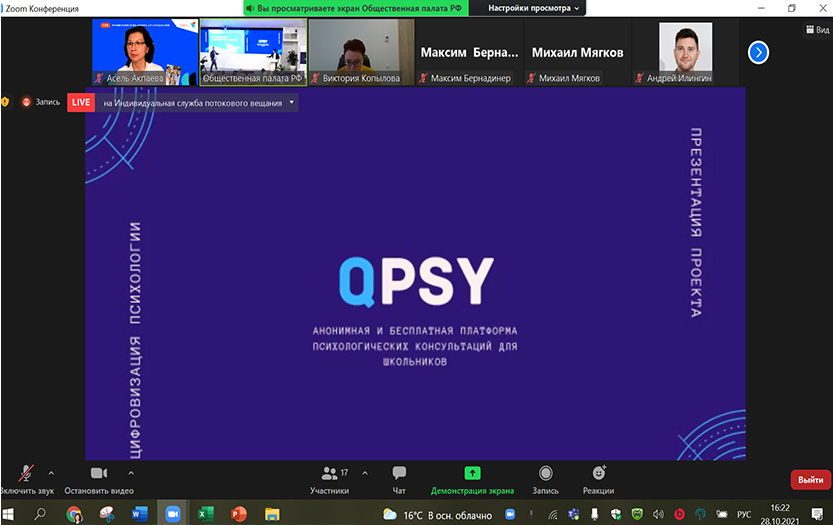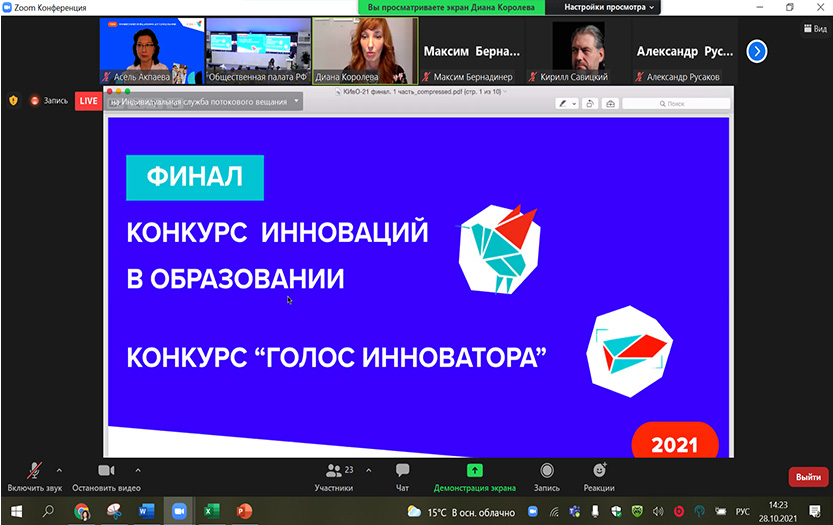The final of the Education Innovation Competition was held in Moscow
On October 28, 2021, the final stage of the Competition for Innovation in Education (KIVO), annually held by the HSE Institute of Education (Moscow, Russia), was completed. This competition was organized and carried out thanks to the support of the Rybakov Foundation, the Public Chamber of Entrepreneurs of the Russian Federation. 15 teams were invited, including 2 teams from Kazakhstan. The jury evaluated the idea, the quality of the presentation, the formation and competence of the teams, the feasibility and management of the project. Candidate of Pedagogical Sciences, associate Professor Akpaeva Asel participated in the jury of the Competition from Abai KazNPU.
The team of the social project «QPSY - Digitalization of psychology» presented its IT-social project. Its authors believe that this application is in demand by modern society to solve psychological problems of personality, as well as to optimize the activities of teachers, psychologists, social educators in Kazakhstan. QPSY - Digitalization of Psychology (Nur-Sultan) has such a name because it includes the development of a web application in conjunction with a telegram bot to provide psychological support to schoolchildren and students. The authors - developers of the application are guys from Nur-Sultan Zhumabai Nurdaulet and Alimusin Beket. The approbation of this program was accompanied by consultations of teachers-psychologists from the Institute of Pedagogy and Psychology under the guidance of PhD, teacher-psychologist of the highest category Akhmetova Aigul.
As a result, the work of the Kazakh team was declared the winner of the kennel along with the Moscow project WM Products, which solves the problem of adapting websites for the visually impaired. It should be noted that the authors of the project Daniil Khachaturov, Gulshat Sukhanova and Kirill Baikin set the urgent task of creating versions of websites for people with special needs. They put the solution of the problem of adaptation of educational sites in the first place. The submitted project has been worked out qualitatively and has earned high marks from the jury.
The second final project from Kazakhstan Smart Grades is a mobile application to increase the motivation of a child in all areas: school, tutors, sections, household chores and even useful habits with the function of rewarding grades. The developers - the Zhaslan and Aliya Tukenov family from Nur-Sultan performed at the final in Moscow together with their son Abilmansur Tukenov (8 years old). They conducted their first experiment already at school number 39 in Nur-Sultan. This is a school for children who found themselves in a difficult life situation, were expelled from other schools, having problems with behavior and learning. According to them, as a result of the pilot, 90% of the triples became drummers in 2 weeks. The relevance of such a project is justified primarily by solving the problem of increasing motivation to teach schoolchildren.
KazNPU supported the projects of the KIvO-Kazakhstan branch. Nominations from the university were provided for the Qpsy project «Digital Transformation of education in Kazakhstan» - the provision of an experimental platform based on 3 IPP specialties. The nomination «Family Laboratory of Education (Kazakhstan)» was announced from the Institute of Pedagogy and Psychology for Smart Grades and a course on teaching mathematics to younger schoolchildren was provided by the authors of the Mathematics textbook (Akpaeva A.B., Lebedeva L.A.).
The head of the project team from Abai KazNPU, Director of IPP Abayeva Galiya expresses gratitude to the partner - HSE (Moscow) in the person Diana Koroleva - the director of the KIvO, co-director of the international project «Selection and evaluation of educational innovations and conducting a pedagogical experiment».
Project team from Abai KazNPU (Akpayeva Assel, Akhmetova Aigul, Tolesheva Ulmeken) has formed a database of educational innovations and has chosen the initiative to conduct a pedagogical experiment - this is the support of the QPSY project - The Digitalization of Psychology.







 Main / Institutes / Institute of Pedagogy and Psychology / Departments / Department of Primary Education / News
Main / Institutes / Institute of Pedagogy and Psychology / Departments / Department of Primary Education / News